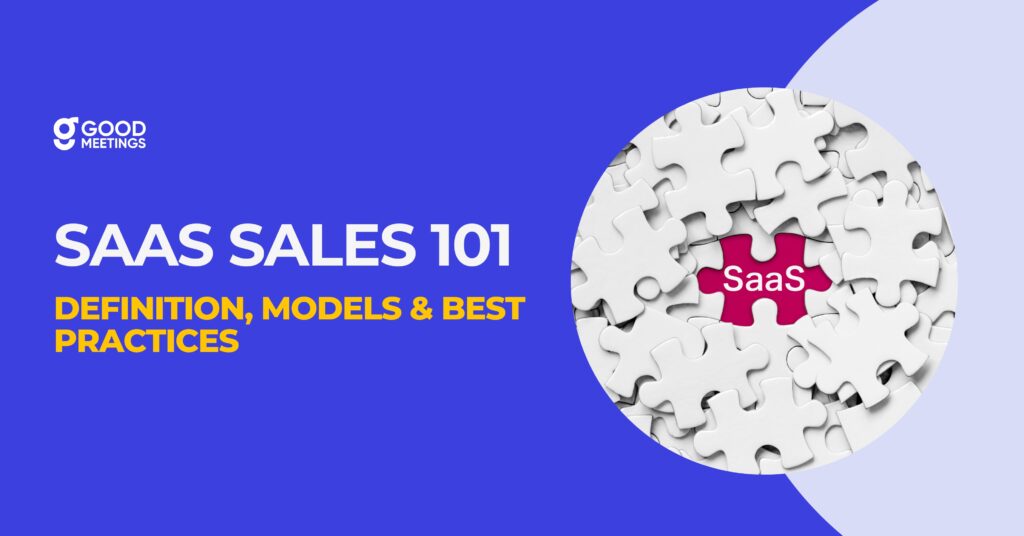Integrating artificial intelligence (AI) into sales processes has become not just a competitive advantage, but a necessity for companies looking to stay ahead.
So, it’s no wonder why, in 2021 alone, the use of AI sales tools surged to over 25%.
Plus, Gartner research found that over a third (35%) of Chief Revenue Officers plan to establish a generative AI operations team in their go-to-market organization by the end of 2025.
These statistics highlight how quickly businesses are adopting AI, as it empowers them to enhance efficiency, optimize processes, and drive revenue growth like never before.
If you’d like to unlock the vast benefits AI has to offer for your team, this guide is for you. Here, we’ll explore the many ways AI is reshaping the sales landscape.
From cutting-edge tools to best use cases, we’ll equip you with the knowledge and tools you need to effectively leverage AI in your sales processes.
Let’s get started!
What is the Role of Artificial Intelligence (AI) in Sales?
AI in sales involves the use of advanced algorithms, machine learning, and data analytics to analyze vast amounts of data, extract valuable insights, automate repetitive tasks, and enhance customer interactions.
By offering tools that can supercharge every step of the sales process, AI drives sales teams to work smarter, not harder.
With the power of AI, sales teams can:
- Predict customer behavior: AI can identify buying patterns and predict future customer behavior by analyzing historical data. This in turn enables sales teams to tailor their approaches and offerings.
- Enhance lead generation and qualification: AI algorithms can sift through vast datasets to identify and prioritize leads based on their likelihood to convert, ensuring sales efforts are focused and efficient.
- Personalize customer experiences: Studies show that 57% of high-performing sales organizations are using AI tools to improve processes and customer experiences, compared to 20% of underperforming teams. So, sales reps can leverage AI to deliver personalized communications and recommendations to customers — it will help them significantly enhance the customer experience and boost loyalty.
- Optimize sales strategies: AI provides actionable insights that help sales teams refine their strategies, focus on high-value activities, and improve overall performance.
- Automate administrative tasks: By automating data entry and other time-consuming administrative tasks, AI frees sales teams to concentrate on building relationships and closing deals.
Related: What is Sales Acceleration? – Tools and Tactics Included
6 Ways to Use Artificial Intelligence in Sales
With 76% of sales professionals anticipating AI to impact their day-to-day jobs within the next year, it’s clear that artificial intelligence is now causing a fundamental shift in how sales are conducted.
Here are six key ways to harness AI in sales, ensuring your team not only keeps pace but leads the charge in this new era.
1. Enhanced lead scoring
AI dramatically improves lead scoring by analyzing large datasets to predict which prospects are most likely to convert.
Traditional methods rely on manual inputs and simple scoring mechanisms. In contrast, AI can assess a plethora of factors, including past interactions, social media activity, and engagement levels, to prioritize leads with precision.
This means sales reps can focus their efforts on leads with the highest conversion potential to optimize time management and resource allocation.
Related: 10 B2B Sales Prospecting Tools in the Market
2. Predictive analytics for sales forecasting
By leveraging historical sales data, AI helps businesses predict future sales trends so that they can easily adjust their strategies accordingly.
With more accurate forecasting, sales teams can better manage inventory, allocate resources effectively, and set realistic sales targets.
3. Text generation
AI’s capabilities in text generation empower sales and marketing teams to create highly personalized and compelling content at scale.
Whether it’s crafting personalized emails, generating dynamic sales copy, or developing targeted content marketing materials, AI can analyze customer data and produce text that resonates deeply with the intended audience.
4. Sales coaching
AI can analyze sales calls and interactions to provide real-time feedback and personalized coaching to sales reps.
By identifying patterns, suggesting improvements, and highlighting successful tactics, AI-powered coaching tools help reps easily refine their approach and improve their performance.
Related: 7 Best Sales Coaching Tools You Cannot Miss Out On
5. Sales enablement
AI also provides sales teams with the tools and information they need to sell more effectively.
Through AI-powered platforms, sales reps can access personalized content recommendations, training materials, and just-in-time information, all tailored to the specific context of their sales interactions.
This ensures they’re always equipped with the most relevant information and best practices at their fingertips.
6. Attribution tracking
AI enhances attribution tracking by accurately analyzing which sales and marketing efforts are contributing to conversions.
By sifting through complex customer journey data, AI attribution models provide clear insights into the effectiveness of various channels and strategies.
This enables businesses to allocate resources more effectively and optimize their sales and marketing mix.
6 Best AI Sales Tools
AI sales tools have quickly become an essential part of the modern sales arsenal, offering insights and automation that were once thought impossible.
Here are some of the best AI sales tools designed to help your team close deals faster and with greater efficiency.
1. Goodmeetings
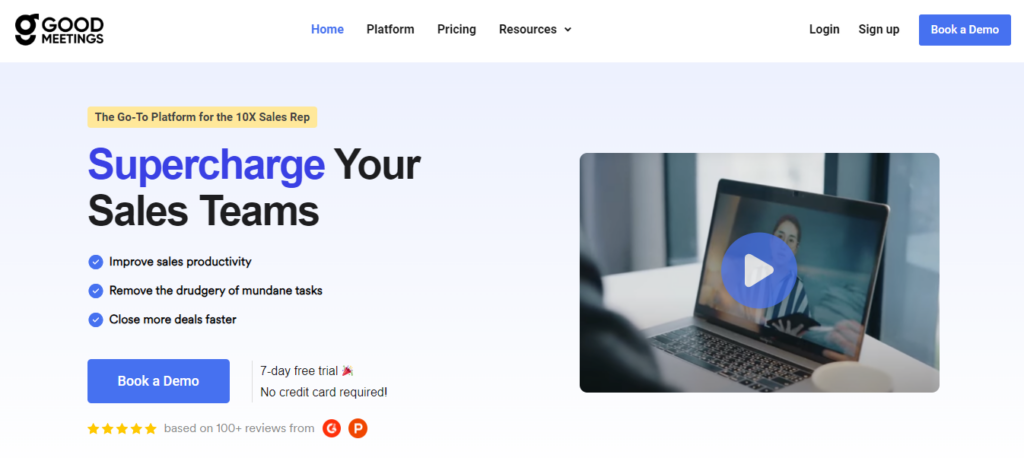
Source: Goodmeetings
First on our list is Goodmeetings, and rightly so. With this AI-powered tool, you can enjoy new levels of sales efficiency.
It uses conversational intelligence to train your team, streamline their workflow, and improve their productivity.
Key features
- Automatically records, transcribes, and summarizes your sales meetings to help you capture every detail contained in your conversations. You can review these transcripts and summaries later to review customer interactions & identify areas where you may need improvement.
- Lets you access customer profiles which include their names, designations, and previous interactions with your business. This will give you a complete picture of your customers so you can easily tailor your approach.
- Provides multi-language support so you can coach teams without worrying about language and cultural barriers.
- Allows you to highlight important moments of your sales calls, making it easier for you to reference key points in your conversation.
- Empowers you to train your reps using AI-based nudges and battlecards or live human coaching.
- Automatically captures responses to custom discovery questionnaires. You can then generate scores and qualify leads based on these responses.
- Automates your workflow by integrating with several tools, including schedulers, video conferencing platforms, and CRM systems.
- Improves your follow-up processes by providing automated action items.
- Offers actionable meeting insights to help you continuously refine meeting strategies and performance.
Related: How to Use AI For Sales Training – Tools and Best Practices
Pricing
- Professional: $70/month ($50/month billed annually)
- Business: $100/month ($75/month billed annually)
Goodmeetings also offers a 7-day free trial with no credit card required.
2. Zoho CRM
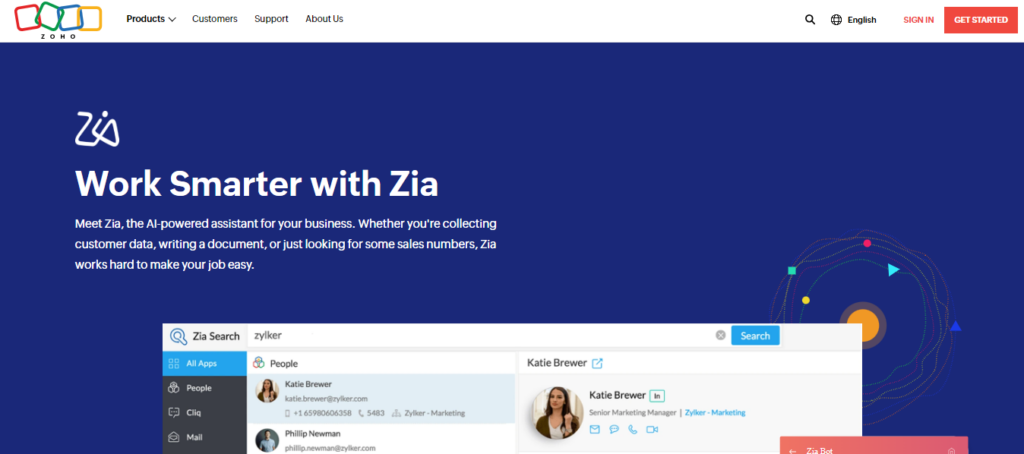
Source: Zoho CRM
Zoho offers a suite of sales and marketing tools, including a CRM platform that sales teams can use to build better customer relationships.
Within Zoho CRM, you can access an AI companion (Zia) that can help you manage your CRM intelligently.
Key features
- Can understand commands and queries issued over text and voice.
- Detects anomalies in sales trends in real-time, allowing teams to quickly respond to deviations and maintain revenue stability.
- Learns usage patterns to make personalized automation suggestions and improve workflow efficiency.
- Predicts the win probability of ongoing deals to help reps focus on the right targets and allocate resources effectively.
- Keeps track of competitor mentions in emails
- Automatically enriches CRM data with information on contacts, accounts, and leads to keep records accurate and up-to-date.
- Provides recommendations for upselling and cross-selling opportunities.
Pricing
- Free
- Standard: $18/user/month ($12/user/month billed annually)
- Professional: $30/user/month ($20/user/month billed annually)
- Enterprise: $45/user/month ($35/user/month billed annually)
- Ultimate: $55/user/month ($45/user/month billed annually)
Zoho CRM’s AI assistant is only available in the Enterprise & Ultimate plans.
3. Clari
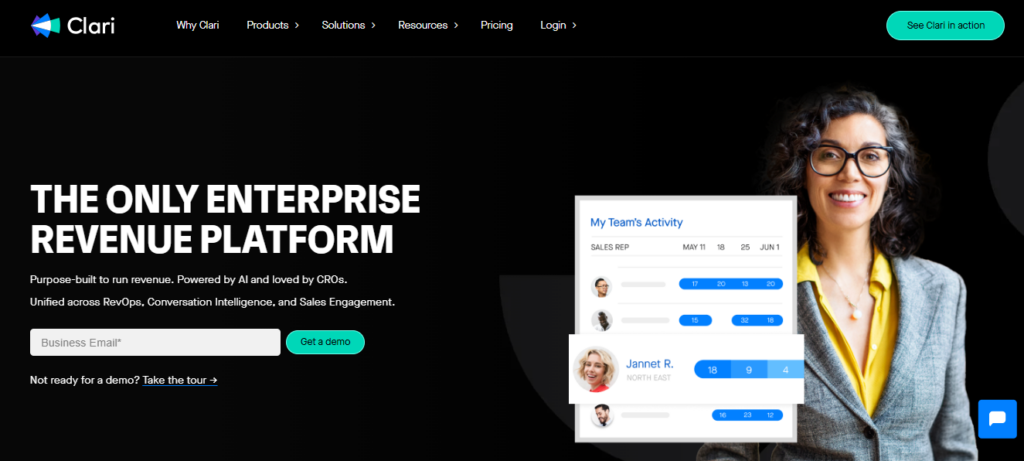
Source: Clari
Clari is an AI-powered enterprise revenue platform that’s designed to improve the way businesses manage their revenue processes.
It offers a unified solution across revenue operations, conversation intelligence, and sales engagement to provide full visibility and control over the revenue lifecycle.
Key features
- Provides a single platform to create, convert, and close deals.
- Offers insights into every stage of the lead and deal lifecycle to help teams make accurate forecasts.
- Allows you to seamlessly manage accounts and opportunities, identify risks, and take swift actions to drive revenue growth.
- Helps you gain practical visibility into all aspects of your business with analytics, dashboards, and reporting.
- Lets you scale prospecting, work deals, and expand accounts with powerful engagement workflows.
- Automates data capture across various channels to improve data quality.
Pricing
You’ll need to request a demo first.
4. Reply
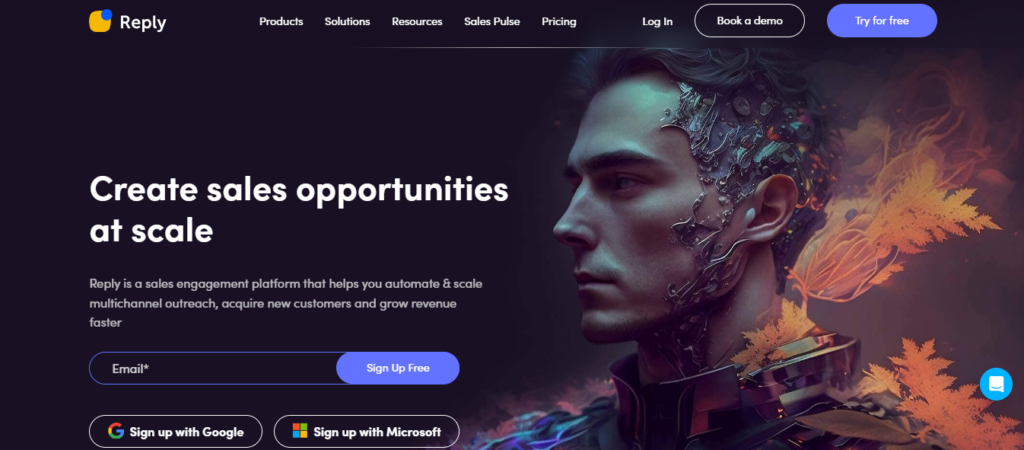
Source: Reply
Reply is a sales engagement platform that aims to enhance the way businesses interact with their prospects and customers.
With advanced AI solutions integrated into its platform, Reply automates and streamlines every aspect of the sales process, to help businesses acquire new customers and grow revenue faster.
Key features
- Offers a B2B company and contacts database containing over 140 million contacts to fuel your pipeline and level up your prospecting efforts.
- Uses its enhanced deliverability feature to make your email outreach more effective.
- Helps you source for prospect data with its Chrome extension.
- Allows you to automate tasks based on specific events or conditions with Triggers.
- Lets you connect with your prospects via multiple channels.
- Provides a B2B AI sales assistant that can help you create 100% human-like emails and follow-ups in seconds.
- Integrates with tools like Salesforce, Hubspot, and Pipedrive.
Pricing
- Free
- Starter: $59/user/month ($49/user/month billed annually)
- Professional: $99/user/month ($89/user/month billed annually)
- Ultimate: $139/user/month billed annually
- Custom Agency Plan: Starts at $166/month
Related: Cold Email Outreach: An SDR’s Ultimate Guide
5. Crayon

Source: Crayon
Crayon provides AI-powered competitive intelligence solutions that empower businesses to track competitors, win more deals, and stay ahead in dynamic markets.
With Crayon, businesses can efficiently monitor competitor activities, receive relevant intel, and focus on high-impact work to drive sales success.
Key features
- Identifies, summarizes, and sends relevant insights to you based on your unique competitive landscape.
- Allows you to see which battlecards your reps use the most, how often each rep uses them, and how overall usage is trending over time.
- Tracks trends across your competitors’ digital footprints and alerts you when a significant anomaly occurs.
- Uses natural language processing (NLP) to grade the sentiment of insights on a scale.
- Automatically classifies new intelligence into more than 80 subcategories.
Pricing
You’ll need to schedule a demo first.
6. Hook
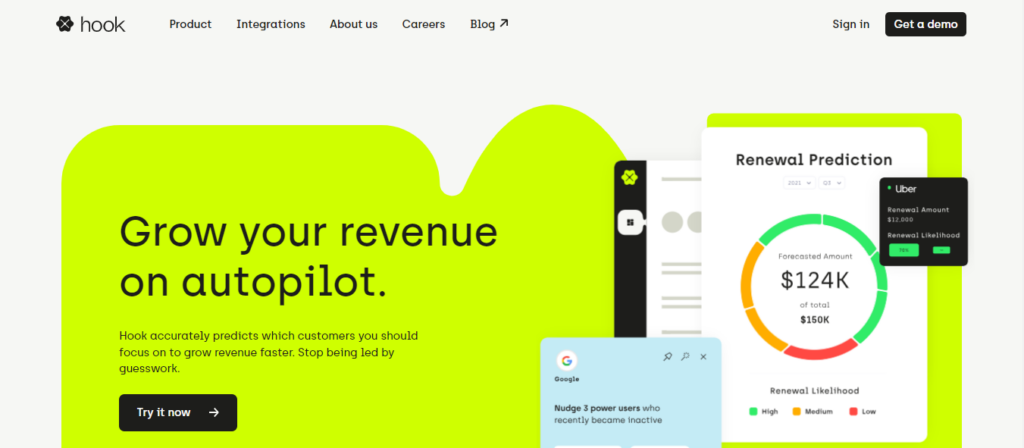
Source: Hook
With its advanced predictive capabilities and automated engagement features, Hook helps businesses make smarter decisions, increase revenue, and build stronger customer relationships.
Key features
- Allows you to identify the highest value customers and prioritize engagement efforts.
- Automatically alerts you when it spots potential revenue impact opportunities.
- Suggests actions that prevent churn and optimize existing accounts.
- Can accurately segment and prioritize accounts based on revenue, risk, or expansion potential.
- Analyzes usage patterns and third-party data to identify upsell opportunities.
- Integrates with tools like Salesforce and HubSpot.
Pricing
You’ll need to schedule a demo first.
Related: 20 Sales Productivity Tools To Boost Your Sales in 2024
Will AI Replace Salespeople?
As artificial intelligence continues to advance and automate tasks traditionally performed by humans, it’s natural to feel concerned.
But, no, AI can’t replace salespeople. Instead, it’s poised to augment and complement their skills, so that they can work more efficiently.
There’s no doubt that AI excels at handling repetitive tasks, crunching vast amounts of data, and identifying patterns that humans might overlook.
However, despite its capabilities, the human element remains irreplaceable in sales.
Building relationships, understanding nuanced customer needs, and negotiating complex deals require emotional intelligence, empathy, and trust-building — qualities that AI can’t replicate.
Sales professionals bring a level of personalization and emotional engagement to the sales process that is crucial for closing deals and fostering long-term customer relationships.
Instead of viewing AI as a threat, salespeople should see it as an opportunity to evolve. By embracing AI tools, sales teams can enrich their skill sets, improve their strategies, and deliver more value to their customers.
Challenges and Limitations of Using AI in Sales
While using AI in sales presents numerous advantages, it’s important to acknowledge the challenges and limitations that come with its adoption.
Understanding these obstacles is essential for leveraging AI effectively while mitigating potential drawbacks.
1. Potential inaccuracies
One significant challenge of using AI tools in sales lies in the potential for inaccuracies.
While AI algorithms are designed to analyze data and make predictions with precision, they aren’t infallible.
Inaccuracies may arise due to various factors such as biased training data or limitations in the algorithm itself. These inaccuracies can lead to erroneous predictions, misinterpretation of customer behavior, and ultimately, misguided sales strategies.
This is why you need to carefully monitor and validate AI outputs before using them, as well as thoroughly understand the limitations of the algorithms employed.
2. Dependence and complacency
There’s a risk that overreliance on AI could lead to complacency among sales teams.
The convenience of automated tasks and AI-driven insights might discourage proactive thinking and personal initiative, qualities that are crucial in sales.
Sales professionals need to use AI as a tool for enhancement, not as a crutch that replaces human judgment and creativity.
3. Integration with existing systems
Integrating AI tools into existing sales and CRM systems can be complex.
Compatibility issues may arise, requiring significant adjustments or even overhauls of current systems.
This incurs costs and demands time and technical expertise, which may not be readily available.
4. Loss of personal touch
While AI can automate and optimize various sales tasks, focusing too much on it can diminish the personal touch that’s crucial in sales.
Maintaining a balance between automated processes and human interaction is essential to ensure that customer relationships remain at the heart of the sales process.
5. Skills gap
The effective use of AI in sales requires a certain level of technical proficiency and understanding of AI capabilities among the sales team.
However, many organizations have a skills gap, with sales professionals often lacking the necessary training to make the most of AI tools.
Bridging this gap requires comprehensive training and ongoing support, and this may prove to be resource-intensive.
Tips & Best Practices for Implementing AI in Sales
Want to properly harness the power of AI to transform your sales processes? Following these tips and best practices will help you do so:
1. Start with clear objectives
Before integrating AI into your sales operations, clearly define what you aim to achieve.
Whether it’s improving lead generation, personalizing customer interactions, or streamlining sales operations, outlining your objectives will guide your choice of AI tools & strategies and ensure they align with your business objectives.
2. Choose the right AI tools
Select AI sales tools that align with your specific needs and objectives. Consider factors such as ease of integration, scalability, support, and security.
Don’t be swayed by the most feature-rich tool; focus on what truly benefits your sales process.
3. Ensure data quality
As we mentioned earlier, AI’s effectiveness is directly linked to the quality of data it processes. Invest in cleaning, organizing, and updating your data to ensure your AI tools generate accurate and actionable insights.
Adopt ongoing data management practices to maintain the integrity of your data over time.
4. Monitor performance & gather feedback
Implementing AI in sales is not a set-it-and-forget-it process. Continuously monitor the performance of AI tools against your objectives, and gather feedback from your sales team and customers.
This will help you identify areas for improvement, adjust strategies as needed, and ensure that your AI tools add value as intended.
5. Balance AI with the human touch
Remember, AI is a tool to enhance, not replace, the human aspect of sales.
Even though AI can process data and automate tasks with unparalleled efficiency, it lacks the empathy, creativity, and relational depth that sales professionals like you bring to the table.
Striking a balance ensures that your customers receive personalized, empathetic service alongside the speed and accuracy that AI provides.
This synergy between human insight and AI capabilities is key to building strong customer relationships and driving sales success.
6. Plan for scalability
You also need to consider how your AI solutions will scale with your business.
Choose flexible platforms that can grow and adapt to your changing needs, ensuring that your investment in AI continues to deliver value over time.
7. Stay informed on AI trends
The field of AI is rapidly evolving, with new tools and capabilities emerging regularly.
Stay informed about the latest developments and be willing to experiment with new solutions that can enhance your sales strategy.
Supercharge Your Sales Team Using AI
With an estimated 75% of B2B companies projected to leverage AI to augment sales by 2025, one thing is clear: AI is here to stay!
Throughout this guide, we’ve explored how you can properly use AI in your sales approach. We’ve also highlighted some of the best AI sales tools available.
And, among these tools, Goodmeetings stands out as a top choice. With its comprehensive suite of AI-powered features, this platform empowers sales teams with the insights, training, and automation needed to achieve sales excellence.
GET IN TOUCH

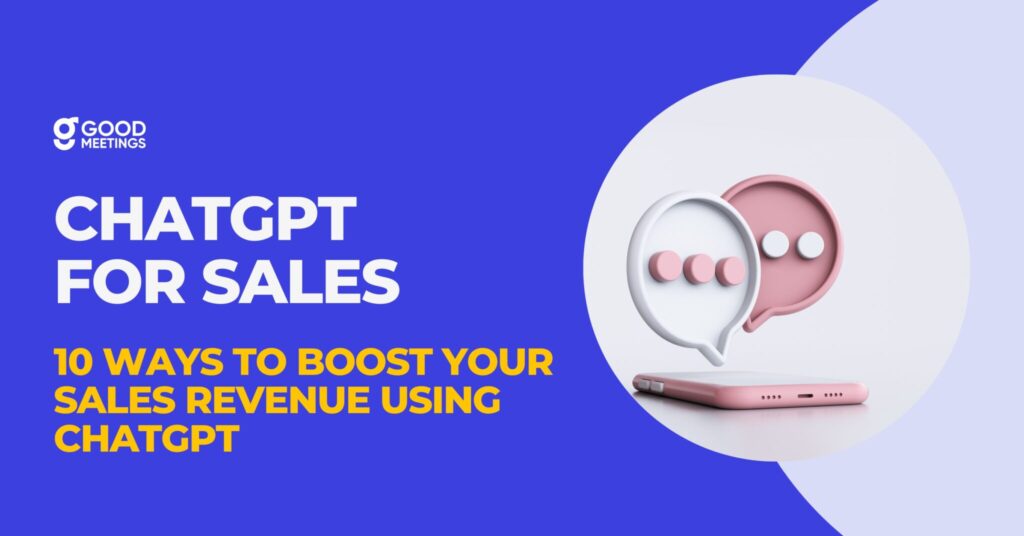

![15 Best AI Sales Tools & Software [2024]](https://goodmeetings.ai/wp-content/uploads/2024/04/THE-ULTIMATE-GUIDE-TO-WINNING-CLOSING-MORE-DEALS-2-1024x536.png)
